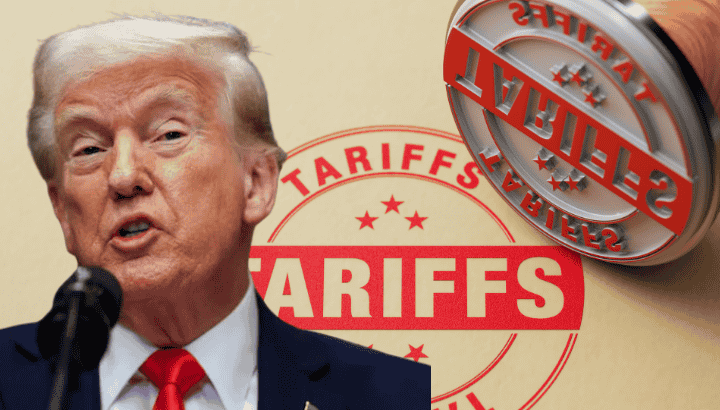Are you feeling nervous about how Trump’s new tariff policies might make things more costly than ever? Then you’re not the only one. When tariffs go up, the prices of daily needs items like groceries, gadgets, and clothes often rise at the same time.
But you don’t need to worry about this if you make some smart personal finance tips, you can stay ahead and protect your hard-earned money smoothly.
In this easy guide, we will discuss some money-saving ideas during inflation that show the Worried About Trump Tariffs 9 Smart Personal Finance Tips to Save Money in 2025 even when the cost of living rises due to tension or tariff changes.
What Are Tariffs and Why Should You Care?
Tariffs are defined as the taxes, which are added to products that are imported from other countries. When these taxes rise, the companies selling those products often transfer the extra cost to customers, which means you pay more.
For example:
During the U.S.-China trade war from 2018 to 2020, American families ended up paying around $1,200 more every year, just because of tariffs. (Source: U.S. Congressional Budget Office)
Items like smartphones, laptops, kitchenware, and even groceries became even more expensive.
That is why personal finance strategies for rising prices are very important right now, because they help you prepare, adapt, and be ready for anything.
Worried About Trump Tariffs? 9 Smart Personal Finance Tips to Save Money in 2025
1. Look at Your Budget & Cut What You Don’t Need
The first step is to know exactly where your money goes. Try these to look at your budget and cut what you don’t need:
Track all the spendings every day for a month and use a simple app like Mint or just write it down in a notebook.
Divide your expenses into needs like rent, food and wants like streaming and takeouts.
Cancel or pause the subscriptions and memberships you don’t really use anymore.
Even a small cut on your expenses can free up extra money for more essential things.
2. Buy in Bulk – the Smart Way
If you think that prices of essential things might go up soon in the market, stock up things in advance. But only if they won’t expire before the market settles down again. Some good bulk buys are:
Toilet paper, detergent, soap
Pasta, rice, canned goods
Toothpaste, shampoo
Tip: Always make sure to check the cost per unit to know that you’re actually saving money.
3. Shop Smart & Use Tools That Save You Money
Prices of essential things may rise quickly, but that doesn’t mean you have to pay full price. Here’s how:
Use browser tools like Honey or Rakuten to find exciting coupons codes and cashback.
Compare prices on different websites before buying anything expensive.
Don’t avoid store-brand or generic items, because they often cost less and work just fine as well.
Being a smart shopper is an important part of a personal finance management journey.
4. Delay Big Purchases (If You Can)
If you are planning to buy something really expensive like a luxury car, smartphone, or a washing machine and it’s not that urgent now, then delay for a bit, especially if tariffs are making those items more costlier.
Money saving idea:
Wait for seasonal or festival sales like Diwali, Black Friday, or Clearance events when prices drop down.
5. Get Rid of High-Interest Debt Fast
High-interest debt, especially credit cards EMIs can silently eat up your income in less time. Interest rates are mostly higher than the inflation or price rises that you’re worried about.
What to do:
Use the Avalanche Method, which means paying off your highest interest first.
If possible, transfer your balance to a lower interest card.
Always make sure to pay more than the minimum to avoid increment in your debt.
Keeping your debt low is a big win for your personal finance strategy in 2025.
6. Start a Side Hustle for Extra Income
When your utility bills or other bills go up, then earning a little extra money side by side can really help. Here are some easy side hustle ideas you can choose:
Freelance through writing content, tutoring, graphic designing.
Selling handmade crafts online or offline.
Food delivery or rideshare driving.
Pursuing small online tasks and choosing platforms like Fiverr or Upwork.
More income means you can save more money and you can even invest that money to grow your money, even if prices go up.
7. Build Your Emergency Fund
An emergency fund is your safeguard for the future, if prices rise up or if a situation related to your job changes then you will have money to fall back on.
Steps to get started:
Set a small goal first, which is between ₹10,000 to ₹25,000.
Save a little from every month’s salary into a separate high-yield saving account.
Use bonuses, tax refunds, or festival gifts to increase your savings more, instead of spending it all.
Experts often suggest saving at least 3 to 6 months of living expenses if possible for an emergency fund.
8. Review Your Investments, Don’t Panic
Tariffs and trade issues can really impact the stock market, but that doesn’t mean that you should sell everything all at once.
Smart moves:
Make sure to check your investments are spread out across different industries and countries, which is called diversification.
Talk to a financial advisor if you are not sure what to do with your investment.
Stay with your long-term financial goals and avoid emotional decisions.
This is a great time to build strong habits in personal finance management by investing in the market without panicking.
9. Buy More Local Products
As the prices of imported items are rising day by day, locally-made generic products may become more affordable and it is just as good.
How to do it:
Shop at local stores more often or farmer’s markets
Always look for “Make in India” or your local region labels.
Make sure that you join local produce co-ops or farm boxes.
This does not help you save more for a safe financial future, but also supports your local economy a lot.
Final Thoughts
Tariffs may cause prices to go up, but you don’t need to panic during that time. The best way to manage money in 2025 is by staying updated, spending wisely, investing smartly, and planning ahead by properly reviewing your budget, saving before you spend, avoiding high-interest debt, growing your income, and being flexible and ready to adjust.
By following these smart personal finance tips, you will be better prepared for whatever comes in your way, whether it’s tariff, inflation, or any other surprising money troubles.

